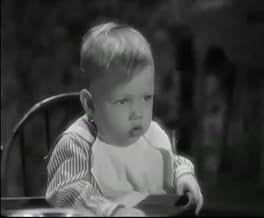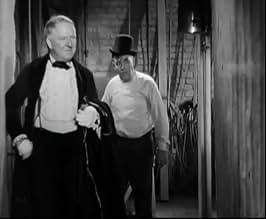Füge eine Handlung in deiner Sprache hinzuThe Great McGonigle and his troupe of third-rate vaudevillians manage to stay one step ahead of the bill collectors and the sheriff.The Great McGonigle and his troupe of third-rate vaudevillians manage to stay one step ahead of the bill collectors and the sheriff.The Great McGonigle and his troupe of third-rate vaudevillians manage to stay one step ahead of the bill collectors and the sheriff.
- Auszeichnungen
- 2 wins total
- Girl in Audience
- (Nicht genannt)
- Mr. Livingston
- (Nicht genannt)
Empfohlene Bewertungen
Because Fields was in his mid-50s when he made this film he was able to turn the tables, in a sense: instead of reprising his real-life role as a starving young actor he'd graduated by this time to the role of the unscrupulous manager, known here simply as The Great McGonigle. McGonigle leads a ragtag troupe of players who are touring the hinterland in that ever-popular temperance warhorse, "The Drunkard." As our story begins this troupe is fleeing a town one step ahead of the sheriff, and heading for their next engagement in the village of Bellefontaine, where prospects don't look much better. In desperate need of cash, McGonigle is compelled to woo a local wealthy widow who aspires to the stage, the magnificently named Cleopatra Pepperday (played with appropriate magnificence by Jan Duggan), while in the meantime his daughter is wooed by a college boy who also dreams of performing. The boarding house where the troupe stays serves as the locale for two hilarious comic set-pieces, back-to-back: first, McGonigle's lunch is ruined by Mrs. Pepperday's rowdy toddler Albert, who flings food in his face, grabs his nose, and dunks his pocket watch in molasses. And then, as if he hadn't been punished enough already, McGonigle must listen to Mrs. Pepperday's spirited rendition of "The Sea Shell Song."
These two sequences alone are reason enough to make this movie a must-see comedy classic, and, interestingly, in each of them Fields himself plays victimized straight man: first to Baby LeRoy, then to Jan Duggan, whose rendition of the song is a show-stopping triumph. Fields' reactions to both of these characters are priceless, but it's also worth pointing out that in this instance the notoriously paranoid, cantankerous W.C. Fields, who was said to be deeply jealous of other comedians, generously shared the spotlight with not one but two fellow players -- one of whom was a baby! -- and permitted each to temporarily steal the spotlight, to the ultimate benefit of the project.
The movie's finale consists of the troupe's performance of "The Drunkard" plus a sentimental song or two, and, best of all, McGonigle's juggling act. This extended sequence feels like an authentic recreation of just what an evening at a small-town theater of the period would have been like, from the cheap-looking sets and declamatory acting styles to the heavy curtain that hits the stage with a crash after each scene. The juggling routine is a special treat, as it represents the most complete filmed record of Fields' legendary feats of legerdemain. My only complaint is that there are a few too many cut-away shots showing audience members' reactions; I'd have been perfectly happy to watch the whole routine in a couple of uninterrupted takes, with no reaction shots at all. But in any event, the juggling act is wonderful.
According to a recent biography of W.C. Fields by James Curtis The Old Fashioned Way suffered through a troubled gestation process. Just as the film was going into production Fields' original screenplay, entitled "Playing the Sticks," was found to be somewhat jumbled and too brief to sustain a feature-length movie. Apparently the savior of the project was an unheralded screenwriter named Jack Cunningham, then known primarily for his earlier work on Westerns such as The Covered Wagon and a couple of Douglas Fairbanks vehicles. It was Cunningham who reworked and expanded Fields' original script into the seamless story it became, and who chose to interpolate the sequences from "The Drunkard." He also persuaded Fields to dust off his old juggling act for the finale. If this background information is correct, then viewers owe a debt of thanks to Mr. Cunningham for his important contribution to this terrifically entertaining, funny, and nostalgic slice of theatrical Americana.
It also contains one of the oddest-named characters in any movie, Cleopatra Pepperday, played wonderfully by Jan Duggan. The scene where she sings Gathering Up The Shells By The Seashore is wonderful. Or when she's rehearsing her "line" in the play, "Here comes the prince!" There is also a fascinating little cultural artifact within the movie -- a production of The Drunkard, a 19th century hit, no doubt popular when William Claude was a mere lad.
As per usual, W.C. Fields is incredible. The fascinating thing about him, to me, is the subtlety of his performance. It doesn't LOOK subtle, I'll grant you, but what strikes me is that there are many layers to his performing in movies. On the one hand, there are the huge gestures and loud, familiar voice, but on the other hand there are the muttered asides, the precise facial reactions, the absurd failure to accomplish the simplest tasks, like put his hat on his head without getting it caught on a cane. That's what I mean by subtle, you almost miss it and then you can't explain to yourself what it is that is so incredibly funny about what he's doing.
There's a bit of controversy about the scene where he kicks Baby LeRoy in the bottom, knocking him across the hall. There are many stories of W.C.'s working with Baby LeRoy. Apparently, on one occasion, Fields poured gin into Baby LeRoy's bottle, and when the child began throwing up and falling over, W.C. snorted, "I told you he was no trouper!"
I think it's awful that so many of W.C. Fields' films are not yet released on DVD. This is an oversight that should be rectified soon, we hope!
This is a period film and it goes back to the turn of the last century right about the time when a young juggler named W.C. Fields was going into vaudeville. The Old Fashioned Way offers us a rare treat to see Fields doing the juggling act which he started in show business with. I'm sure Fields drew from his experiences way back when to both write the original story on which the film is based and to give his usual good performance.
The film has a musical score of mostly old public domain standards, but the songwriting team of Mack Gordon and Harry Revel wrote a couple of original songs for the film. Gordon and Revel were with Paramount at the time, but would soon move to 20th Century Fox where they wrote a number of songs Alice Faye introduced. Morrison has a nice tenor voice and a pleasing, but somewhat limp personality. He does the best known song from the film, Poor Folk well with his tenor, but I have a bootleg radio recording of Russ Columbo doing it on one of his radio shows. Russ's baritone is far more suitable to the number than Morrison's tenor.
Still the show in this film is Fields and no one comes near stealing this film from him. Actress Jan Duggan plays the rich spinster who has stage ambitions and who Fields courts relentlessly, even putting himself through the torture of hearing her sing a really stupid song about gathering sea shells. Duggan would play Bill Fields's foil in several more film after The Old Fashioned Way.
Fans of the eternal Fields will like The Old Fashioned Way and if you see it you'll become a fan of W.C. Fields.
Here is W. C. Fields in all of his pompous, vulgar glory: evasive, duplicitous, sneaky - utterly wonderful. Delivering dialogue in his unique buzz saw rasp, he gives out so many familiar lines that at times he almost seems to be performing a self-parody. This film brilliantly shows why Fields needed the sound cinema to let him be fully appreciated, and with Paramount giving him free rein to develop his material as he wished, it is not surprising that the film is a classic. Fans need look no further to find the essential Fields.
The romance between Judith Allen & Joe Morrison is a rather dull affair, although the young man sings well. Tammany Young plays Fields' loyal amanuensis. Movie mavens will recognize comedian Billy Bletcher as the tomato thrower & sour-visaged sheriff Clarence Wilson, both uncredited. Legend has it that Hollywood's first movie star, Florence Lawrence, derelict & forgotten, made one of her last unbilled appearances here before her 1938 suicide.
Fields found it useful to populate his films with at least one she-dragon, a female of frightful aspect against whom he could bounce off some of his best humor. This film has two: rail-thin, Nora Cecil - prim & dour as the troupe's suspicious landlady; and most especially silly Jan Duggan, horridly bejeweled & curled, as Field's wealthy target. Here was an actress, now nearly forgotten, who could easily equal in hilarity even Fields himself. It is generally overlooked how important her contribution is to the celebrated supper table scene with Fields & Baby LeRoy - one of the funniest sequences ever to appear in an American film. And her rendition of `Gathering Up The Shells On The Seashore' is a wonderful spoof of such sentimental songs as `When You And I Were Young, Maggie,' which were so popular in that era. Miss Duggan would return to briefly plague Fields in three additional films, including THE BANK DICK (1940). (She died in 1977 at the age of 95.)
Fields has included the old melodrama The Drunkard into the plot and to his credit he plays it straight,' letting its honest antique sentiment speak for itself. In his own private olio, Fields makes a curtain call to show off his astonishing talent of legerdemain. It is wonderful to have his routine captured on film as he really is quite amazing - it is easy to see how at one time he was considered the world's greatest juggler. Now he is remembered as one of cinema's supreme comics.
Wusstest du schon
- WissenswertesW.C. Fields recreates his famous vaudeville juggling routine with the cigar boxes.
- PatzerBetty is described as the leading lady of the troupe--as one would expect, since she is The Great McGonigle's daughter. But she takes no part in the show; another actress plays the female lead.
- Zitate
Dick Bronson: Mr. McGonigle, I've got to have some money.
The Great McGonigle: Yes, my lad, how much?
Dick Bronson: Two dollars.
The Great McGonigle: If I had two dollars, I'd start a number two company.
Dick Bronson: For two cents I'd quit.
The Great McGonigle: [to Marmaduke] Pay him off!
[Marmaduke gives him a two cent stamp]
- Crazy CreditsThe end credits are in 2 parts; the first contain the actors and their character names in the film as a whole; The second contains the actors and their character names in the play, "The Drunkard." Five actors, therefore, are credited twice: W.C. Fields, Joe Morrison, Judith Allen, Samuel Ethridge and Ruth Marion.
- VerbindungenFeatured in Hollywood: The Gift of Laughter (1982)
- SoundtracksWe're Just Poor Folks Rolling in Love
(1934) (uncredited)
Lyrics by Mack Gordon
Music by Harry Revel
Sung by Joe Morrison
Top-Auswahl
Details
- Erscheinungsdatum
- Herkunftsland
- Sprache
- Auch bekannt als
- Die gute alte Zeit
- Drehorte
- Produktionsfirma
- Weitere beteiligte Unternehmen bei IMDbPro anzeigen
- Laufzeit
- 1 Std. 11 Min.(71 min)
- Farbe
- Seitenverhältnis
- 1.37 : 1






























